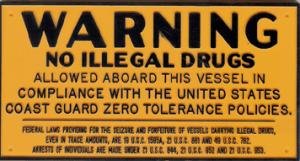I have been considering what the marijuana legalization in Washington state will do to our employee policies regarding alcohol and drug use. While thinking about that, the question of pot on board occurred to me.
For those of you that are not WA residents, we just passed a referendum that will make pot legal and taxable by December 6th. Because the law's so new and it is still federally illegal, some interesting questions have arisen. We are also neighbors with British Columbia, and there is a thriving illegal trade coming over the border through our waters. Because we're on an international border, our waters are well patrolled by the Coast Guard.
We have younger friends and family that are occasional users of pot, and when inviting them on our boat I tell them that they cannot bring illegal drugs aboard because it puts both them and our boat in jeopardy if we are boarded by the Coast Guard. With pot use legal in our state, I'm a little more concerned that someone may bring it on board, thinking it's no big deal. To further complicate the issue, we charter our boat out of Anacortes for about 8 weeks in the summer. Many of the charter customers go across the border to Canada. I think the charter policies are already written to protect against this liability, but I'm going to have to check the wording.
I'm not looking for political or moral arguments here, just a discussion of the boating legal and liability issues.
Lyle
For those of you that are not WA residents, we just passed a referendum that will make pot legal and taxable by December 6th. Because the law's so new and it is still federally illegal, some interesting questions have arisen. We are also neighbors with British Columbia, and there is a thriving illegal trade coming over the border through our waters. Because we're on an international border, our waters are well patrolled by the Coast Guard.
We have younger friends and family that are occasional users of pot, and when inviting them on our boat I tell them that they cannot bring illegal drugs aboard because it puts both them and our boat in jeopardy if we are boarded by the Coast Guard. With pot use legal in our state, I'm a little more concerned that someone may bring it on board, thinking it's no big deal. To further complicate the issue, we charter our boat out of Anacortes for about 8 weeks in the summer. Many of the charter customers go across the border to Canada. I think the charter policies are already written to protect against this liability, but I'm going to have to check the wording.
I'm not looking for political or moral arguments here, just a discussion of the boating legal and liability issues.
Lyle


